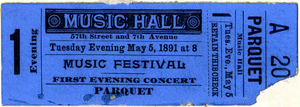Carnegie Hall's Historical Archival Collections Named as Carnegie Hall Susan W. Rose Archives
This naming is in recognition of Susan W. Rose’s longstanding support of the Hall’s Archives and Rose Museum over the course of the past thirty years.

Carnegie Hall today announced that its historical archival collections have been named as the Carnegie Hall Susan W. Rose Archives. This naming is in recognition of Susan W. Rose's longstanding support of the Hall's Archives and Rose Museum over the course of the past thirty years.
A Carnegie Hall trustee since 1988, Mrs. Rose's support of Carnegie Hall's Archives began not long after it was first established in 1986. Over the last three decades, many of the historic materials that have been collected have been put on display to concertgoers and the public in Carnegie Hall's Rose Museum, opened in 1991 and funded by the Susan and Elihu Rose Foundation. Over time, she has underwritten close to 40 special museum exhibits aligned with Carnegie Hall's programming and history. In 2012, generous support from their foundation also helped launch an initiative to digitize, conserve, and share Carnegie Hall's important legacy materials, including its collection of Carnegie Hall program books dating from 1891. "Not long after I became Chairman of Carnegie Hall, Suzy invited me to visit the Hall's Archives," said Robert F. Smith, Chairman of Carnegie Hall's Board of Trustees. "Her enthusiasm for the Hall's history was infectious as was Suzy's determination to preserve the ephemeral and defining moments of this great performance hall. We are immensely grateful for her stewardship of these essential collections which play a central role in helping us to share the Hall's story with the world."The Carnegie Hall Archives was established in 1986 in preparation for the Hall's centennial celebrations in 1991. Since no central repository existed prior to that time, a significant portion of the Hall's documented history had been lost, discarded, or otherwise forgotten. Over the last 30 years, Carnegie Hall's Archives team, led by Mr. Francesconi, meticulously re-constructed the Hall's history, frequently turning to concertgoers, artists, and music lovers across the country to collect more than 300,000 items related to more than 50,000 performances and events in its three concert halls; construction of the building and its subsequent alterations; and the many notable artists, world figures, and personalities who have graced the Hall's stages. Many of these artifacts have been put on display to concertgoers and the public in Carnegie Hall's Rose Museum, opened in 1991 and funded by the Susan and Elihu Rose Foundation.
In 2012, the Archives entered a new chapter in its development with the launch of a Digital Archives Project. This initiative has enabled Carnegie Hall to conserve and digitize most of its historic materials-many of which were previously available only on paper or in obsolete media formats-ensuring that the Hall's legacy is preserved and can be shared with future generations forever. In 2013, searchable program information from 1891 through the present day was made available directly to the public through the Performance History Search, continuously updated on the Carnegie Hall website. In 2019, the Hall's new Digital Collections invited the public to search and explore select archival collections online for the very first time. Today, online visitors to the Digital Collections can discover and download more than 80,000 recently digitized items drawn from the Hall's legacy collections, offering a window into its richly diverse history. Digital materials include Carnegie Hall concert programs from 1891-1925, flyers, photographs, correspondence, newspaper clippings, autographs, booking ledger pages, and promotional flyers. Recent additions include a collection of conductor Walter Damrosch's memorabilia, including a letter of introduction written by Franz Liszt to be used by Leopold Damrosch upon arrival in America; the William B. Tuthill collection with questionnaires sent by the architect to venues and music halls throughout Europe as he began his designs for Carnegie Hall; and accounting ledgers from the Music Hall Company of New York that track artist pay in the Hall's early history, including for Tchaikovsky who Andrew Carnegie invited to open the Hall in 1891. This online destination for exploration will continue to expand in future with new digital collections added over time.Videos

